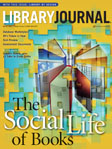 The Institute is on the cover of Library Journal this week! A big article called “The Social Life of Books,” which gives a good overview of the intersecting ideas and concerns that we mull over here daily. It all started, actually, with that little series of posts I wrote a few months back, “the book is reading you” (parts 3, 2 and 1), which pondered the darker implications of Google Book Search and commercial online publishing. The article is mostly an interview with me, but it covers ideas and subjects that we’ve been working through as a collective for the past year and a half. Wikipedia, Google, copyright, social software, networked books — most of our hobby horses are in there.
The Institute is on the cover of Library Journal this week! A big article called “The Social Life of Books,” which gives a good overview of the intersecting ideas and concerns that we mull over here daily. It all started, actually, with that little series of posts I wrote a few months back, “the book is reading you” (parts 3, 2 and 1), which pondered the darker implications of Google Book Search and commercial online publishing. The article is mostly an interview with me, but it covers ideas and subjects that we’ve been working through as a collective for the past year and a half. Wikipedia, Google, copyright, social software, networked books — most of our hobby horses are in there.
I also think the article serves as a nice complement (and in some ways counterpoint) to Kevin Kelly’s big article on books and search engines in yesterday’s New York Times Magazine. Kelly does an excellent job outlining the thorny intellectual property issues raised by Google Book Search and the internet in general. In particular, he gives a very lucid explanation of the copyright “orphan” issue, of which most readers of the Times are probably unaware. At least 75% of the books in contention in Google’s scanning effort are works that have been pretty much left for dead by the publishing industry: works (often out of print) whose copyright status is unclear, and for whom the rights holder is unknown, dead or otherwise prohibitively difficult to contact. Once publishers’ and authors’ groups sensed there might finally be a way to monetize these works, they mobilized a legal offensive.
Kelly argues convincingly that not only does Google have the right to make a transformative use of these works (scanning them into a searchable database), but that there is a moral imperative to do so, since these works will otherwise be left forever in the shadows. That the Times published such a progressive statement on copyright (and called it a manifesto no less) is to be applauded. That said, there are other things I felt were wanting in the article. First, at no point does Kelly question whether private companies such as Google ought to become the arbiter of all the world’s information. He seems pretty satisfied with this projected outcome.
And though the article serves as a great introduction to how search engines will revolutionize books, it doesn’t really delve into how books themselves — their form, their authorship, their content — might evolve. Interlinked, unbundled, tagged, woven into social networks — he goes into all that. But Kelly still conceives of something pretty much like a normal book (a linear construction, in relatively fixed form, made of pages) that, like Dylan at Newport in 1965, has gone electric. Our article in Library Journal goes further into the new networked life of books, intimating a profound re-jiggering of the relationship between authors and readers, and pointing to new networked modes of reading and writing in which a book is continually re-worked, re-combined and re-negotiated over time. Admittedly, these ideas have been developed further on if:book since I wrote the article a month and a half ago (when a blogger writes an article for a print magazine, there’s bound to be some temporal dissonance). There’s still a very active thread on the “defining the networked book” post which opens up many of the big questions, and I think serves well as a pre-published sequel to the LJ interview. We’d love to hear people’s thoughts on both the Kelly and the LJ pieces. Seems to make sense to discuss them in the same thread.
if:book
A Project of the Institute for the Future of the Book
